- <a href="https://library.nhrc.or.th/th" aria-label="home" class="mainMenu"> <em class="fas fa-home"></em> </a>
-
เกี่ยวกับเรา
ย้อนกลับ เกี่ยวกับเรา<a href="https://library.nhrc.or.th/th/history" aria-label="menu" class="submenu-list" target="_self"> ความเป็นมา </a> <a href="https://library.nhrc.or.th/th/structure" aria-label="menu" class="submenu-list" target="_self"> โครงสร้าง </a> <a href="https://library.nhrc.or.th/th/vision" aria-label="menu" class="submenu-list" target="_self"> วิสัยทัศน์/พันธกิจ </a> <a href="https://library.nhrc.or.th/th/award" aria-label="menu" class="submenu-list" target="_self"> รางวัล </a> <a href="https://library.nhrc.or.th/th/announce" aria-label="menu" class="submenu-list" target="_self"> ระเบียบ/ประกาศ </a> นโยบายองค์กรอัลบั้มภาพ<a href="https://library.nhrc.or.th/th/website-policy" aria-label="menu" class="submenu-list"> นโยบายเว็บไซต์ </a> <a href="https://library.nhrc.or.th/th/website-security-policy" aria-label="menu" class="submenu-list"> นโยบายการรักษาความมั่นคงปลอดภัยเว็บไซต์ </a> <a href="https://library.nhrc.or.th/th/personal-information-protection-policy" aria-label="menu" class="submenu-list"> นโยบายการคุ้มครองข้อมูลส่วนบุคคล </a> <a href="https://library.nhrc.or.th/th/privacy-policies" aria-label="menu" class="submenu-list"> นโยบายความเป็นส่วนตัว </a> <a href="https://library.nhrc.or.th/th/terms-of-service" aria-label="menu" class="submenu-list"> เงื่อนไขการใช้บริการ </a> <a href="https://library.nhrc.or.th/th/cookies-policy" aria-label="menu" class="submenu-list"> นโยบายคุกกี้ </a><a href="https://library.nhrc.or.th/th/album-image" aria-label="menu" class="submenu-list"> อัลบั้มภาพ </a> <a href="https://library.nhrc.or.th/th/gallery360" aria-label="menu" class="submenu-list"> ภาพ 360° </a>
-
บริการ
ย้อนกลับ บริการ<a href="https://library.nhrc.or.th/th/borrow-and-return" aria-label="menu" class="submenu-list" target="_self"> การยืม-คืน </a> <a href="https://library.nhrc.or.th/th/service" aria-label="menu" class="submenu-list" target="_self"> บริการทั้งหมด </a> <a href="https://library.nhrc.or.th/th/flow-service" aria-label="menu" class="submenu-list" target="_self"> ขั้นตอนการใช้บริการ </a> <a href="https://library.nhrc.or.th/th/imfortable" aria-label="menu" class="submenu-list" target="_self"> สิ่งอำนวยความสะดวก </a> แบบฟอร์มบริการ<a href="https://forms.gle/syLmif2eKJ3kfA2g9" aria-label="menu" class="submenu-list" target="_blank"> ประเมินความพึงพอใจ </a> <a href="https://library.nhrc.or.th/th/event" aria-label="menu" class="submenu-list" target="_self"> กิจกรรม </a> <a href="https://library.nhrc.or.th/th/plan" aria-label="menu" class="submenu-list" target="_self"> แนะนำพื้นที่ </a><a href="https://library.nhrc.or.th/th/form-search" aria-label="menu" class="submenu-list"> แบบฟอร์มบริการค้นหาสารสนเทศ </a> <a href="https://library.nhrc.or.th/th/form-suggestions" aria-label="menu" class="submenu-list"> แบบฟอร์มแนะนำทรัพยากรสารสนเทศ </a>
-
แหล่งสารสนเทศ
ย้อนกลับ แหล่งสารสนเทศ<a href="https://library.nhrc.or.th/th/search?ctrl=kw&searchopt=&type=place&keyword=14" aria-label="menu" class="submenu-list" target="_self"> สิ่งพิมพ์สำนักงาน กสม. </a> <a href="https://library.nhrc.or.th/th/search" aria-label="menu" class="submenu-list" target="_self"> ทรัพยากรสารสนเทศทั้งหมด </a> สารสนเทศด้านสิทธิมนุษยชน<a href="https://library.nhrc.or.th/th/network" aria-label="menu" class="submenu-list" target="_self"> เครือข่ายความร่วมมือระหว่างห้องสมุด </a> <a href="https://library.nhrc.or.th/th/dictionary" aria-label="menu" class="submenu-list" target="_self"> พจนานุกรมศัพท์สิทธิมนุษยชน </a> <a href="https://library.nhrc.or.th/th/sourceresearch" aria-label="menu" class="submenu-list" target="_self"> ฐานข้อมูลงานวิจัย/วิทยานิพนธ์ </a> <a href="https://www.tci-thaijo.org/" aria-label="menu" class="submenu-list" target="_blank"> ฐานข้อมูลวารสารอิเล็กทรอนิกส์ (ThaiJO) </a> <a href="https://ncx.dataxet.co/" aria-label="menu" class="submenu-list" target="_blank"> ฐานข้อมูลข่าวออนไลน์ </a> <a href="http://library.nhrc.or.th/document/Manual/APA.pdf" aria-label="menu" class="submenu-list" target="_blank"> คู่มือการเขียนอ้างอิงทางวิชาการ </a><a href="https://library.nhrc.or.th/th/law-of-human-rights" aria-label="menu" class="submenu-list"> กฎหมายด้านสิทธิมนุษยชน </a> <a href="https://library.nhrc.or.th/th/international-human-rights" aria-label="menu" class="submenu-list"> สิทธิมนุษยชนระหว่างประเทศ </a> <a href="https://library.nhrc.or.th/th/international-human-rights-treaties" aria-label="menu" class="submenu-list"> พันธกรณีระหว่างประเทศ </a> <a href="https://library.nhrc.or.th/th/national-human-rights-commissions" aria-label="menu" class="submenu-list"> สถาบันสิทธิมนุษยชนแห่งชาติ </a> <a href="https://library.nhrc.or.th/th/judgment" aria-label="menu" class="submenu-list"> คำพิพากษาของศาล </a> <a href="https://library.nhrc.or.th/th/human-rights-online-resources" aria-label="menu" class="submenu-list"> แหล่งสารสนเทศด้านสิทธิมนุษยชน </a> <a href="https://library.nhrc.or.th/th/un-and-affiliated-agencies" aria-label="menu" class="submenu-list"> กองทุนและโครงการของสหประชาชาติ </a>
-
สถิติ
ย้อนกลับ สถิติ<a href="https://library.nhrc.or.th/th/statistic/1" aria-label="menu" class="submenu-list" target="_self"> การเข้าใช้บริการ </a> <a href="https://library.nhrc.or.th/th/statistic/2" aria-label="menu" class="submenu-list" target="_self"> การยืมทรัพยากรสารสนเทศ </a> <a href="https://library.nhrc.or.th/th/statistic/3" aria-label="menu" class="submenu-list" target="_self"> บริการตอบคำถามและช่วยการค้นคว้า </a> <a href="https://library.nhrc.or.th/th/statistic/4" aria-label="menu" class="submenu-list" target="_self"> จำนวนทรัพยากรสารสนเทศ </a> <a href="https://library.nhrc.or.th/th/statistic/5" aria-label="menu" class="submenu-list" target="_self"> จำนวนผู้เยี่ยมชมและศึกษาดูงาน </a> <a href="https://library.nhrc.or.th/th/statistic/6" aria-label="menu" class="submenu-list" target="_self"> การใช้งานผ่านเว็บไซต์ </a> <a href="https://library.nhrc.or.th/th/statistic/7" aria-label="menu" class="submenu-list" target="_self"> รายงานผลการปฎิบัติงานฯ </a>
-
ติดต่อเรา
ย้อนกลับ ติดต่อเรา<a href="https://library.nhrc.or.th/th/faq" aria-label="menu" class="submenu-list" target="_self"> คำถามที่พบบ่อย </a> <a href="https://library.nhrc.or.th/th/opening-hours-close-calendar" aria-label="menu" class="submenu-list" target="_self"> เวลาทำการ/ปฏิทินวันหยุด </a> <a href="https://library.nhrc.or.th/th/contacts-us" aria-label="menu" class="submenu-list" target="_self"> ติดต่อเรา </a>
-
สมาชิก
ย้อนกลับ สมาชิก<a href="https://library.nhrc.or.th/th/membership-application" aria-label="menu" class="submenu-list" target="_self"> สมัครสมาชิก </a> <a href="https://library.nhrc.or.th/th/member/login" aria-label="menu" class="submenu-list" target="_self"> ระบบสมาชิก </a>
Interlinkages and the effectiveness of multilateral environmental agreements
| ประเภท | เลขเรียก | สถานที่ | สถานะ | |
|
K3585 C444 2008 |
มุมหนังสือทั่วไป | บนชั้น | ขอยืม |
| ISBN |
9789280811490 (pbk.)
|
| เลขเรียก |
K3585 C444 2008
|
| ผู้แต่ง | |
| ชื่อเรื่อง |
Interlinkages and the effectiveness of multilateral environmental agreements / W. Bradnee Chambers.
|
| พิมพลักษณ์ |
New York : United Nations University Press, c2008.
|
| รูปเล่ม |
xviii, 311 p. ; 24 cm.
|
| บทคัดย่อ |
A major reason for the worsening global environment is the failure to create institutional responses that fully address the scope, magnitude, and complexity of environmental problems. Much of the criticism directed at global institutions has focused on the necessity for greater coordination and synergism among environmental institutions, policies, and legal instruments, and the need for approaches that take better account of the interrelationships between ecological and societal systems. This book seeks to fill the existing gap in knowledge and policymaking that exists, particularly in international law. It examines assumptions made about interlinkages and multilateral environmental agreements (MEAs), provides a framework for measuring the effectiveness of MEAs, and shows how the effectiveness of MEAs can be improved by interlinkages. Moreover, the book demonstrates how environmental agreements that cooperate with treaties in other sectors of sustainable development can improve their effectiveness.
|
| หมายเหตุแหล่งที่มา |
With the compliments of International Human Rights Affair Bureau, NHRC.
|
| หัวเรื่อง | |
| หัวเรื่อง | |
| หัวเรื่อง | |
| หัวเรื่อง | |
| คำศัพท์ | |
| เชื่อมโยง |
| LEADER : 00000nab 2200000uu 4500 |
| 008 190517s2008||||nyu 000 0 eng d |
| 020 ^a9789280811490 (pbk.) |
| 050 00^aK3585^bC444 2008 |
| 100 1 ^aChambers, W. Bradnee |
| 245 10^aInterlinkages and the effectiveness of multilateral environmental agreements /^cW. Bradnee Chambers. |
| 260 ^aNew York :^bUnited Nations University Press, ^cc2008. |
| 300 ^axviii, 311 p. ^c24 cm. |
| 504 ^aIncludes bibliographical references and index. |
| 520 ^aA major reason for the worsening global environment is the failure to create institutional responses that fully address the scope, magnitude, and complexity of environmental problems. Much of the criticism directed at global institutions has focused on the necessity for greater coordination and synergism among environmental institutions, policies, and legal instruments, and the need for approaches that take better account of the interrelationships between ecological and societal systems. This book seeks to fill the existing gap in knowledge and policymaking that exists, particularly in international law. It examines assumptions made about interlinkages and multilateral environmental agreements (MEAs), provides a framework for measuring the effectiveness of MEAs, and shows how the effectiveness of MEAs can be improved by interlinkages. Moreover, the book demonstrates how environmental agreements that cooperate with treaties in other sectors of sustainable development can improve their effectiveness. |
| 536 ^aWith the compliments of International Human Rights Affair Bureau, NHRC. |
|
650 0^aEnvironmental law, International
650 0^aPollution prevention 650 0^aAgricultural biotechnology^xLaw and legislation 650 0^aGermplasm resources conservation^xLaw and legislation |
| 653 ^aNew Arrivals 06-2019 |
| 856 40^3Content^uhttp://library.nhrc.or.th/ulib/document/Content/T10580.pdf |
| 917 ^aGift :^c1088 |
| 955 ^a1 copy |
| 999 ^asaithip |
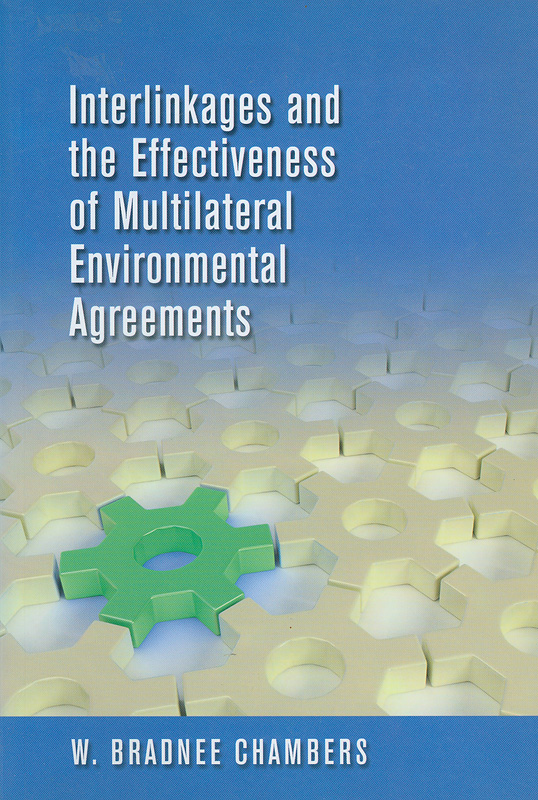
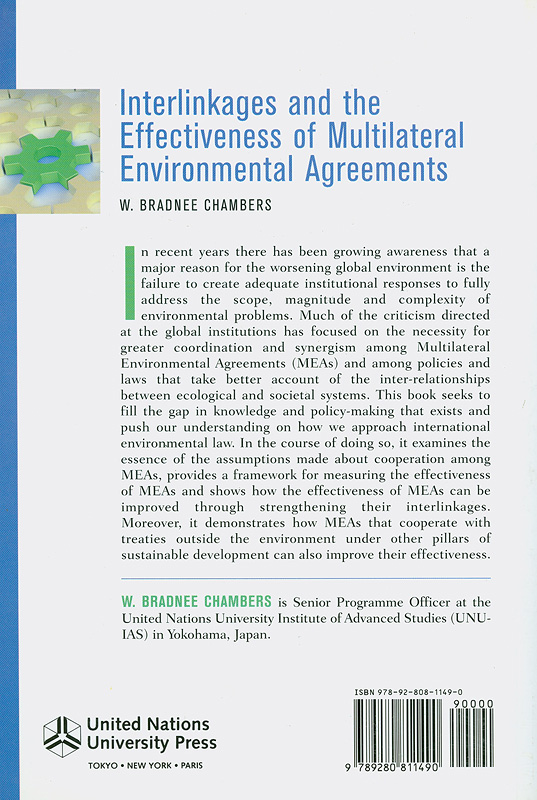
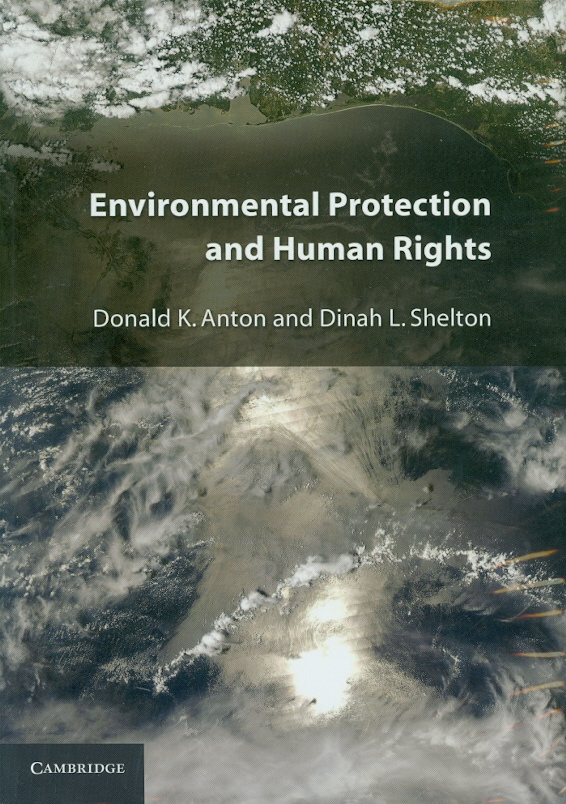
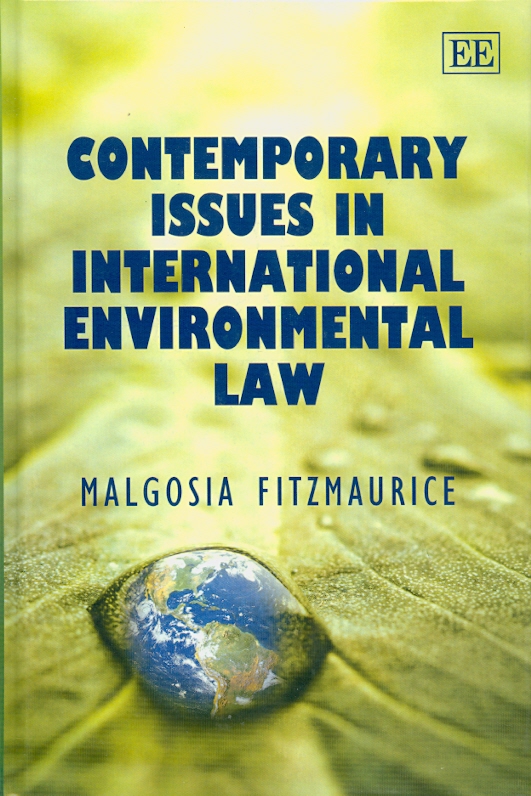
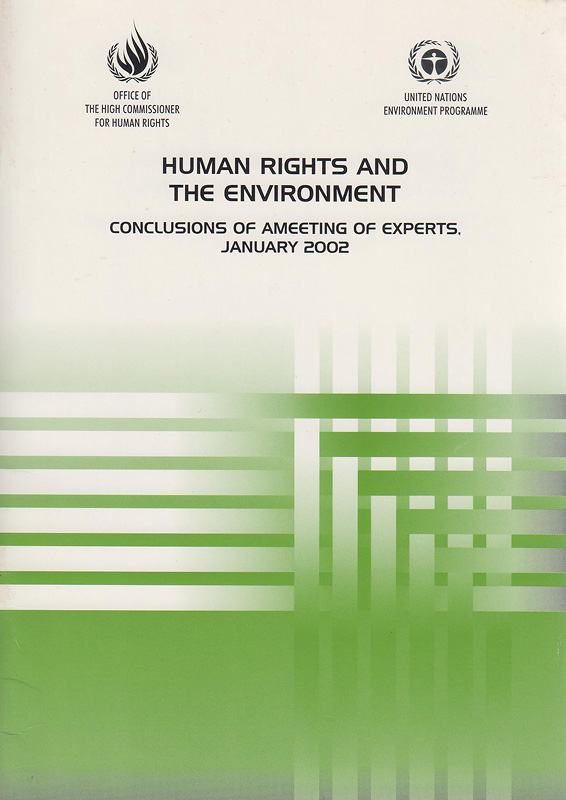

ก่อนเพิ่มแท็กหรือแสดงความคิดเห็น